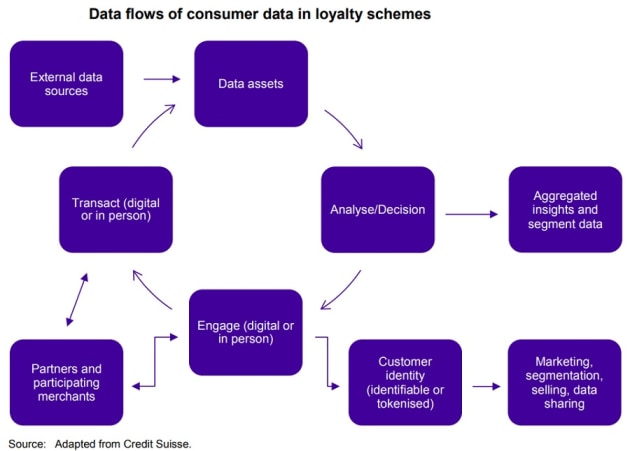
If you join a loyalty scheme, the operator will probably end up knowing more about you than you want them to.
And it could mean, based on your data profile, being charged different prices for an identical product or service than someone else.
The consumer watchdog, the ACCC, wants changes to the law to provide stricter regulation on what personal data can be used for targeted advertising.
Digital advertising campaigns can be highly effective when deep data is used from loyalty schemes. Agencies including Red Planet, owned by Qantas with access to its frequent flyer database, offers this type of campaign.
The ACCC’s final report into customer loyalty schemes recommends that frequent flyer, supermarket and hotel operators, better inform consumers, improve their data practices and stop automatically linking payment cards to member profiles.
“We are calling on companies that offer loyalty schemes to improve both their data practices and how they communicate with consumers, to help consumers understand how these programs operate,” says ACCC Chair Rod Sims.
“Even simple changes, such as more prominently alerting customers that their points are about to expire, for example, in the subject line of an email, could help prevent a consumer from losing points earned over several years.”
The ACCC is also concerned that the profiling of consumers based on the data collected by schemes, including through the sharing of consumer insights with third parties, could result in increasingly targeted advertising.
This could also result in different consumers being offered different prices for an identical product or service.
“Many consumers are increasingly concerned about receiving targeted advertising, in some cases from companies that they have never dealt with before,” says Sims.
“There is also an emerging risk of real consumer harm if individual consumers were to be charged inflated prices based on profiling derived from their data.
"For example, if a person’s frequent flyer data or online search history indicates they can only travel on certain dates, or otherwise based on their income, geographic location or other information collected through the loyalty scheme they may be charged extra.”
Another major concern with loyalty schemes are privacy policies that are vague and seek broad consents from consumers about how they’re going to collect, use and disclose their data.
“Many consumers would be shocked to find that some supermarket schemes continue to collect their customers’ data at the checkout even when they do not present their loyalty cards. They do this by tracking customers’ credit or debit cards from previous transactions,” says Sims.
“When a customer chooses not to present their loyalty card, we think it is reasonable that they would not expect their data to be collected for that transaction, and we are therefore calling on the relevant schemes to stop this practice.”
The ACCC report recommends that unfair contract terms be prohibited, rather than simply being voidable, and that a new law against certain unfair trading practices be considered.
“Our recommendations would protect consumers and help ensure consumer trust in loyalty schemes, in the digital economy and in data-based innovation, which is a benefit for the broader economy," says Sims.
Have something to say on this? Share your views in the comments section below. Or if you have a news story or tip-off, drop us a line at adnews@yaffa.com.au
Sign up to the AdNews newsletter, like us on Facebook or follow us on Twitter for breaking stories and campaigns throughout the day.



